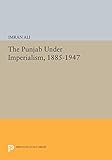The Punjab Under Imperialism, 1885-1947 / Imran Ali.
Material type: TextSeries: Princeton Legacy Library ; 923Publisher: Princeton, NJ : Princeton University Press, [2014]Copyright date: ©1988Edition: Course BookDescription: 1 online resource (278 p.)Content type:
TextSeries: Princeton Legacy Library ; 923Publisher: Princeton, NJ : Princeton University Press, [2014]Copyright date: ©1988Edition: Course BookDescription: 1 online resource (278 p.)Content type: - 9780691602356
- 9781400859580
- Agricultural colonies -- India -- Punjab -- History
- Agriculture -- Economic aspects -- India -- Punjab -- History
- Elite (Social sciences) -- India -- Punjab -- History
- Irrigation farming -- India -- Punjab -- History
- Land settlement -- India -- Punjab -- History
- BUSINESS & ECONOMICS / Development / Economic Development
- online - DeGruyter
- Issued also in print.
| Item type | Current library | Call number | URL | Status | Notes | Barcode | |
|---|---|---|---|---|---|---|---|
 eBook
eBook
|
Biblioteca "Angelicum" Pont. Univ. S.Tommaso d'Aquino Nuvola online | online - DeGruyter (Browse shelf(Opens below)) | Online access | Not for loan (Accesso limitato) | Accesso per gli utenti autorizzati / Access for authorized users | (dgr)9781400859580 |
Frontmatter -- CONTENTS -- LIST OF TABLES -- PREFACE -- ABBREVIATIONS -- Chapter One. A New Agrarian Frontier -- Chapter Two. Colonisation -- Chapter Three. Entrenchment -- Chapter Four. Militarisation -- Chapter Five. Extraction -- Chapter Six. Production -- Chapter Seven. Growth and Underdevelopment -- GLOSSARY -- BIBLIOGRAPHY -- INDEX
restricted access online access with authorization star
http://purl.org/coar/access_right/c_16ec
The Punjab--an area now divided between Pakistan and India--experienced significant economic growth under British rule from the second half of the nineteenth century. This expansion was founded on the construction of an extensive network of canals in the western parts of the province. The ensuing agricultural settlement transformed the previously barren area into one of the most important regions of commercial agriculture in South Asia. Nevertheless, Imran Ali argues that colonial strategy distorted the development of what came to be called the "bread basket" of the Indian subcontinent. This comprehensive survey of British rule in the Punjab demonstrates that colonial policy making led to many of the socio-economic and political problems currently plaguing Pakistan and Indian Punjab.Subordinating developmental goals to its political and military imperatives, the colonial state cooperated with the dominant social classes, the members of which became the major beneficiaries of agricultural colonization. Even while the rulers tried to use the vast resources of the Punjab to advance imperial purposes, they were themselves being used by their collaborators to advance implacable private interests. Such processes effectively retarded both nationalism and social change and resulted in the continued backwardness of the region even after the departure of the British.Originally published in 1988.The Princeton Legacy Library uses the latest print-on-demand technology to again make available previously out-of-print books from the distinguished backlist of Princeton University Press. These editions preserve the original texts of these important books while presenting them in durable paperback and hardcover editions. The goal of the Princeton Legacy Library is to vastly increase access to the rich scholarly heritage found in the thousands of books published by Princeton University Press since its founding in 1905.
Issued also in print.
Mode of access: Internet via World Wide Web.
In English.
Description based on online resource; title from PDF title page (publisher's Web site, viewed 30. Aug 2021)


